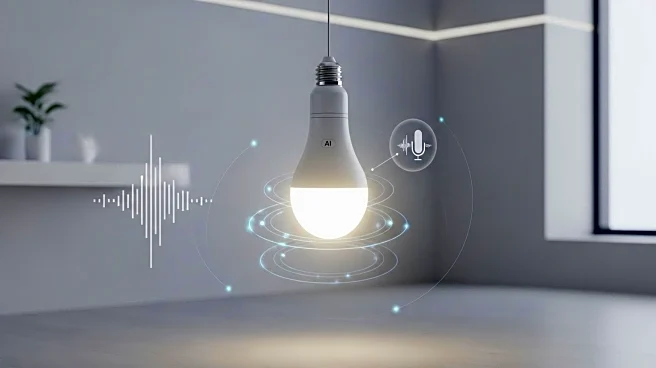What's Happening?
Lepro, a lighting company, has unveiled its new AI Lighting Pro series at the IFA 2025 event. This innovative line includes various lighting products such as a tabletop lamp, LED strip light, neon rope light, and a floor lamp, all equipped with microphones to receive voice commands directly. Unlike traditional smart lighting systems that rely on external voice assistants like Google or Alexa, Lepro's lights have built-in AI design assistants. These assistants are trained on color and design content, allowing them to interpret user scenarios and adjust lighting accordingly. Users can simply state their desired ambiance, such as 'birthday party' or 'romantic dinner,' and the lights will automatically adjust without needing specific color inputs. This setup eliminates the need for additional smart speakers or hubs, as the lights themselves handle voice commands.
Why It's Important?
The introduction of Lepro's AI-powered lighting represents a significant advancement in home automation technology. By integrating AI directly into lighting products, Lepro offers a more seamless and intuitive user experience. This development could potentially disrupt the smart home market by reducing dependency on external voice assistants and hubs, making smart lighting more accessible and user-friendly. The ability to create personalized lighting scenes through simple voice commands could appeal to a wide range of consumers, from tech enthusiasts to those seeking convenience in home management. Additionally, this innovation highlights the growing trend of AI integration in everyday household products, which could lead to further advancements in smart home technologies.
What's Next?
Lepro plans to release the AI Lighting Pro series for sale later this year, although pricing details have not yet been disclosed. As the product becomes available, it is likely to attract attention from both consumers and competitors in the smart home industry. The success of Lepro's AI lighting could prompt other companies to explore similar integrations, potentially leading to a broader adoption of AI-driven home automation solutions. Consumer feedback and market reception will play crucial roles in determining the future development and expansion of AI-powered home products.











